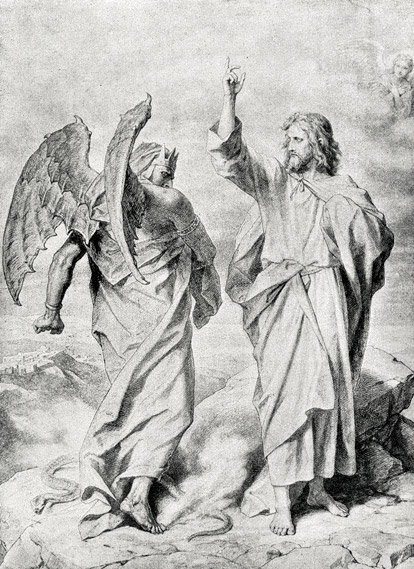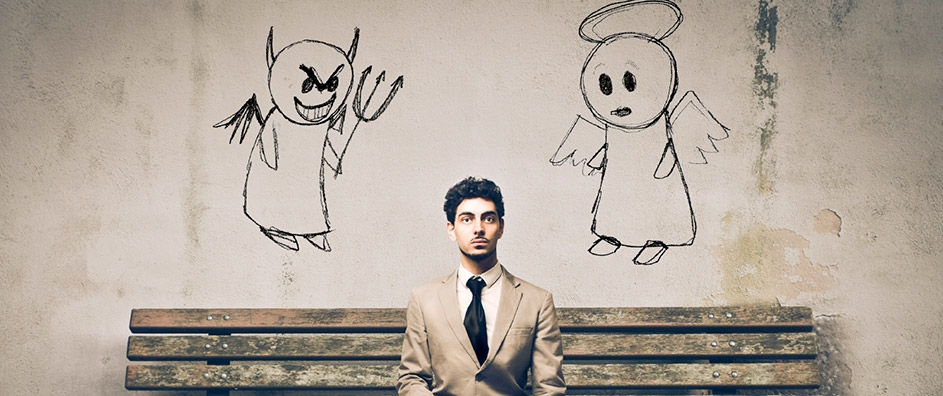The views expressed in our content reflect individual perspectives and do not represent the authoritative views of the Baha'i Faith.
All that which ye potentially possess can, however, be manifested only as a result of your own volition. Your own acts testify to this truth. … Men, however, have wittingly broken His law. Is such a behavior to be attributed to God, or to their proper selves? Be fair in your judgment. Every good thing is of God, and every evil thing is from yourselves. Will ye not comprehend? – Baha’u’llah, Gleanings From the Writings of Baha’u’llah, pp. 149-150.
Baha’u’llah’s epigraph on evil is the epitaph of Satan.
This passage changed my life. It had such an enduring impact on me, liberating me from the fear and dread of “Satan.”
How, you may well ask? After all, the passage doesn’t even mention Satan. That’s the point. A powerful “argument from silence,” indeed! This remarkable passage — simple, yet profound in its implications — struck me as much for what it did not say, as for what it did say.
When I first read, “every evil thing is from yourselves”– preceded by the statement, “Your own acts testify to this truth”– I was dumbstruck, thunderstruck, awestruck at the sudden clarity I felt, and by the tandem, awesome responsibility the passage imparts. Now I had to face the real origin of evil — in the mirror.
As far as evil is concerned, I learned that “the buck stops here.” (Pun with my last name fully intended.)
When I read this passage, I finally realized that Satan does not exist outside of symbolizing human evil. Satan is a personification of evil, not an evil persona.
Satan is not a person. Satan is a myth. To hold otherwise is misplaced belief. You see, I grew up with Satan as part of my Christian upbringing. I was told in Sunday School that Satan could even disguise himself as an angel of light:
And no marvel; for Satan himself is transformed into an angel of light. – 2 Corinthians 11:14.
 As a kid, this made me afraid, even paranoid. Satan could be lurking anywhere. Worse still, Satan was everywhere – iniquitous and ubiquitous. As a child, the idea of Satan possessed me. Satan “scared the bejesus” out of me. (The Oxford English Dictionary defines “bejesus” as an “alteration of the oath, by Jesus.”) But Baha’u’llah’s explanation liberated me. How?
As a kid, this made me afraid, even paranoid. Satan could be lurking anywhere. Worse still, Satan was everywhere – iniquitous and ubiquitous. As a child, the idea of Satan possessed me. Satan “scared the bejesus” out of me. (The Oxford English Dictionary defines “bejesus” as an “alteration of the oath, by Jesus.”) But Baha’u’llah’s explanation liberated me. How?
For Baha’is, Baha’u’llah exorcizes Satan, exposing Satan for who he really is (and for who he is not). Baha’u’llah slays the primordial Dragon. The Baha’i teachings show me that Satan is a superstition, a diversion, a perversion of the real source of evil. When I first read this epigraph shortly after becoming a Baha’i forty years ago, I was struck by yet another sudden insight: I don’t have to believe in Satan to believe in Christ. That thought, alone, was liberating, purifying, empowering. Why, you may ask?
Let me be blunt: To be a Christian today, you pretty much have to believe in Satan, as well as in Christ. Think about it! Can Christianity exist without Satan? I think it can. But probably most Christians have not thought about the problem of Satan in quite this way.
Don’t get me wrong: To be a Christian is to follow Christ and to accept Him as your Lord and Savior. But if Christ saves you from Original Sin, and if Original Sin was brought about by Satan, the serpent in the Garden of Eden (how did Satan sneak into Eden?), then being a Christian, in this sense, entails a belief in an evil being, a spirit named Satan. The prevailing doctrine of salvation implicates Satan.
You can see the connection: no Satan, no salvation. Not unless Christ’s offer of salvation has another meaning. Which the Baha’i writings clarify, along with the question of the existence of Satan:
The reality underlying this question is that the evil spirit, Satan or whatever is interpreted as evil, refers to the lower nature in man. This baser nature is symbolized in various ways. In man there are two expressions, one is the expression of nature, the other the expression of the spiritual realm…. God has never created an evil spirit; all such ideas and nomenclature are symbols expressing the mere human or earthly nature of man. It is an essential condition of the soil of earth that thorns, weeds and fruitless trees may grow from it. Relatively speaking, this is evil; it is simply the lower state and baser product of nature. — Abdu’l-Baha, Promulgation of Universal Peace, pp. 294–295.
And further:
“The meaning of the serpent is attachment to the human world.” – Abdu’l-Baha, Some Answered Questions, p. 123.
In other words, Satan is a personification of evil, not an evil persona. And to believe in Christ, without requiring a concomitant belief in Satan, revisions the person and work of Christ in a revolutionary and revitalizing way.
When we understand Satan as a symbol and not a reality, we can begin to grasp the Baha’i view of evil as the iron rule of the ignoble self, in contrast to the golden rule of the noble self.















